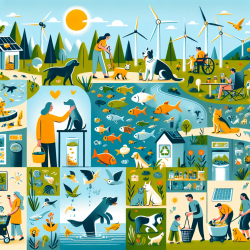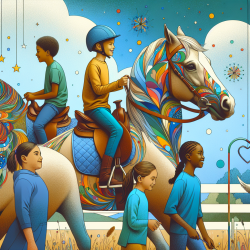Introduction
In a rapidly changing climate, the impact on companion animals and their role in exacerbating climate change is becoming increasingly significant. The research article "Climate Change and Companion Animals: Identifying Links and Opportunities for Mitigation and Adaptation Strategies" highlights the intricate relationship between climate change and companion animals, offering insights into potential strategies for mitigation and adaptation. This blog aims to translate these findings into actionable strategies for practitioners, encouraging them to enhance their skills and contribute to a sustainable future.
Understanding the Impact
The research identifies several climate change outcomes, such as increased extreme weather events, human migration, and heightened social inequities, which directly and indirectly affect companion animals. These outcomes not only threaten animal welfare but also strain the human-animal bond, which is crucial for both human and animal well-being. Practitioners must recognize these challenges and proactively address them in their work.
Opportunities for Mitigation and Adaptation
To mitigate the impact of climate change on companion animals, practitioners can implement several strategies:
- Educating Owners: Increase awareness about the risks of leaving pets in hot cars and the importance of maintaining a healthy weight to improve heat tolerance.
- Improving Breeding Practices: Encourage breeding practices that avoid phenotypes prone to heat-related issues, such as brachycephalic breeds.
- Enhancing Disaster Preparedness: Advocate for the inclusion of companion animals in disaster planning and the establishment of pet-friendly shelters.
- Promoting Sustainable Pet Care: Encourage the use of environmentally friendly pet food and products to reduce the ecological pawprint.
Building Climate Resilience
Practitioners can play a pivotal role in building climate resilience by addressing social inequities within the companion animal field. This includes ensuring equitable access to veterinary care and advocating for policies that consider the needs of vulnerable populations. By fostering an inclusive environment, practitioners can contribute to a more resilient community capable of withstanding climate change impacts.
Conclusion
The intersection of climate change and companion animals presents both challenges and opportunities for practitioners. By integrating data-driven strategies into their practice, they can mitigate the impact of climate change on companion animals and enhance the human-animal bond. As we strive for a sustainable future, it is imperative that practitioners actively engage in these efforts, leveraging their expertise to drive positive change.
To read the original research paper, please follow this link: Climate Change and Companion Animals: Identifying Links and Opportunities for Mitigation and Adaptation Strategies.










